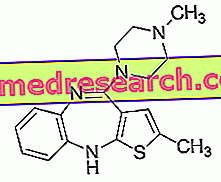
What is Ketek?
Ketek is a medicine containing the active substance telithromycin. Ketek is available in orange-colored oblong tablets containing 400 mg of telithromycin.
What is Ketek used for?
Ketek is indicated for the treatment of mild to moderate adult patients with community-acquired pneumonia (a lung infection contracted outside the hospital).
It is also indicated for the treatment of adults suffering from the following infections caused by bacteria with a known or suspected resistance to beta-lactams or macrolides (ie insensitive to these types of antibiotics):
- acute exacerbation (acute) of chronic bronchitis (prolonged inflammation of the airways of the lungs);
- acute sinusitis (short-lived infection of the paranasal sinuses, the cavities located in the bones of the nose and of the eyes delegated to the passage of air).
Ketek is also used in patients 12 years old and more affected by tonsillitis or pharyngitis (inflammation of the tonsils or throat) caused by the bacterium Streptococcus pyogenes, when therapy with beta-lactam antibiotics is not adequate, as well as in states or regions with high levels of resistance to macrolides.
The drug should be prescribed taking into account official guidelines on the appropriate use of antibacterial agents and local levels of antibiotic resistance.
The medicine can only be obtained with a prescription.
How is Ketek used?
The recommended dose of Ketek is 800 mg (two tablets) once a day. The tablets should be swallowed whole with water, before or after meals. Taking Ketek in the evening before bedtime can reduce the possible impact of unwanted effects such as visual disturbances and loss of consciousness. For the treatment of pneumonia it is necessary to take the tablets for 7-10 days, while for the other infections the tablets are taken for 5 days.
In patients with severe renal impairment associated with certain liver problems it may be necessary to use a lower dose of the drug. For more information, see the package leaflet.
How does Ketek work?
The active ingredient of Ketek, telithromycin, is an antibiotic belonging to the class of "ketolides", ie antibacterial agents related to macrolides. Telithromycin blocks the bacterial ribosomes (the parts of the cell in which proteins are produced) and, in this way, inhibits the growth of bacteria. The Summary of Product Characteristics (also included with EPAR) includes the list of bacteria against which Ketek is active.
What studies have been carried out on Ketek?
Ketek has been examined in 10 major studies involving a total of over 4, 000 patients. Four studies evaluated the effects of the drug in the treatment of mild or moderate community-acquired pneumonia, two examined acute sinusitis, two acute exacerbations of chronic bronchitis and two others tonsillitis or pharyngitis. In all of the studies, with the exception of two, the effects of Ketek were compared with those of other antibiotics. The main measure of effectiveness was the percentage of patients recovered at the end of treatment, measured by the reduction in symptoms, or a "satisfactory" decrease in the amount of bacteria detected in the samples.
What benefit has Ketek shown during the studies?
Ketek was as effective as the antibiotics used for the comparison. In the treatment of pneumonia and chronic bronchitis, Ketek has proved to be as effective as amoxicillin, clarithromycin, trovafloxacin, amoxicillin / clavulanic acid and acetyl-cefuroxime, with a percentage of patients between 82 and 95% who reported no symptoms at the end of the therapy. In patients with acute sinusitis, 5 to 10-day therapy cycles with Ketek showed similar healing rates, a result similar to that recorded with amoxicillin / clavulanic acid treatment. In the treatment of tonsillitis or pharyngitis, in 84-92% of patients treated with Ketek, penicillin or clarithromycin, a satisfactory reduction in the concentrations of bacteria was observed in the samples taken from the throat.
What is the risk associated with Ketek?
The most common side effect with Ketek (seen in more than 1 patient in 10) is diarrhea. For the full list of all side effects reported with Ketek, see the Package Leaflet.
Ketek should not be used in people who may be hypersensitive (allergic) to telithromycin, macrolides or other ingredients in the medicine. It must also not be used in patients with myasthenia gravis (a nervous disorder that causes muscle weakness) or in patients who have previously contracted hepatitis (inflammation of the liver) or jaundice (yellowing of the skin) in association with taking telithromycin. Finally, Ketek should not be given to patients receiving any of the following medicines:
- cisapride (used to relieve some digestive problems);
- "ergot alkaloid derivatives" such as ergotamine and dihydroergotamine (treatment of migraine);
- pimozide (treatment of mental illnesses);
- astemizole or terfenadine (commonly used in the treatment of allergic symptoms; these drugs can be purchased without a prescription);
- simvastatin, atorvastatin or lovastatin (used to lower blood cholesterol levels).
Ketek should not be taken by patients with a personal or family history of long QT syndrome or acquired prolonged QT interval (slow heart rate). In patients with severely impaired renal or hepatic function, Ketek should not be given at the same time as other drugs that may affect the assimilation of telithromycin, including protease inhibitors (used in the treatment of HIV) and ketoconazole (an antifungal medicine).
Why has Ketek been approved?
The Committee for Medicinal Products for Human Use (CHMP) concluded that Ketek's benefits outweigh its risks. The Committee recommended that Ketek be given marketing authorization, although it noted that, compared to other antibiotics, the medicine is associated with an increased risk of causing certain side effects. Some of these effects can be serious, including worsening of myasthenia gravis, transient loss of consciousness and temporary vision disorders. Therefore, the committee decided that its use should be limited to the treatment of community-acquired pneumonia, the treatment of bronchitis and sinusitis caused by bacteria resistant to beta-lactams or macrolide antibiotics, and of tonsillitis / pharyngitis when these antibiotics do not can be employed.
More information on Ketek:
On 9 July 2001, the European Commission granted Ketek a marketing authorization valid throughout the European Union to Aventis Pharma SA. The marketing authorization was renewed on 9 July 2006.
The full EPAR for Ketek can be found here.
Last update of this summary: 11-2007.



